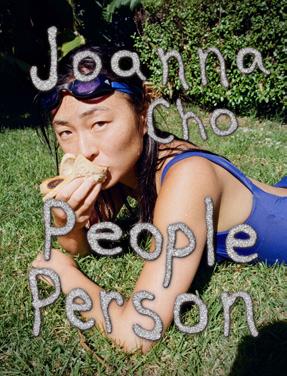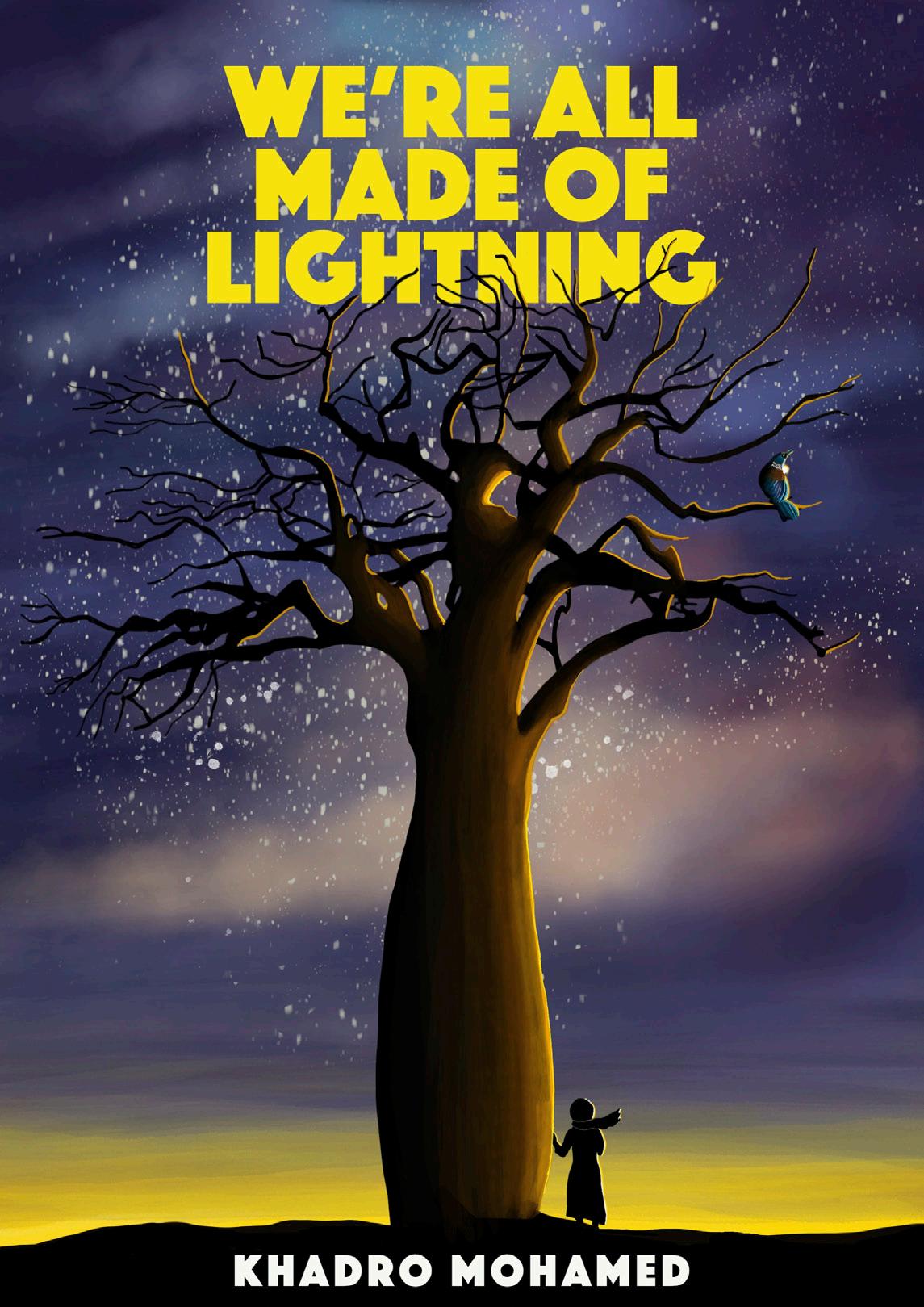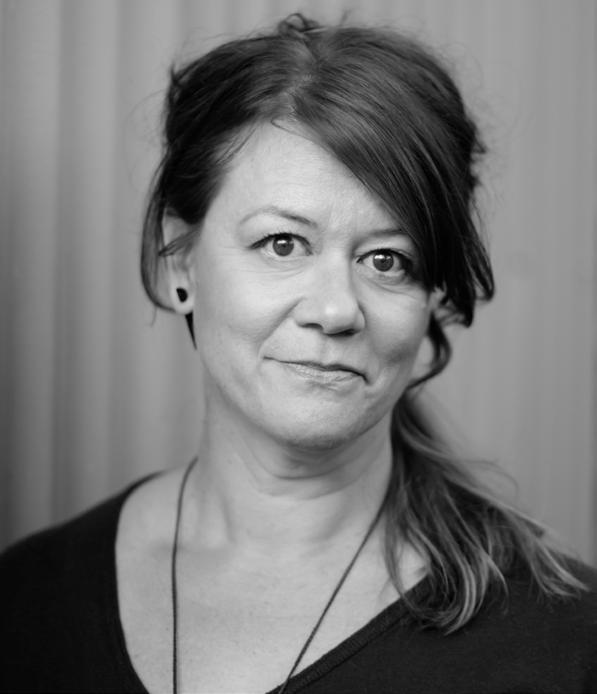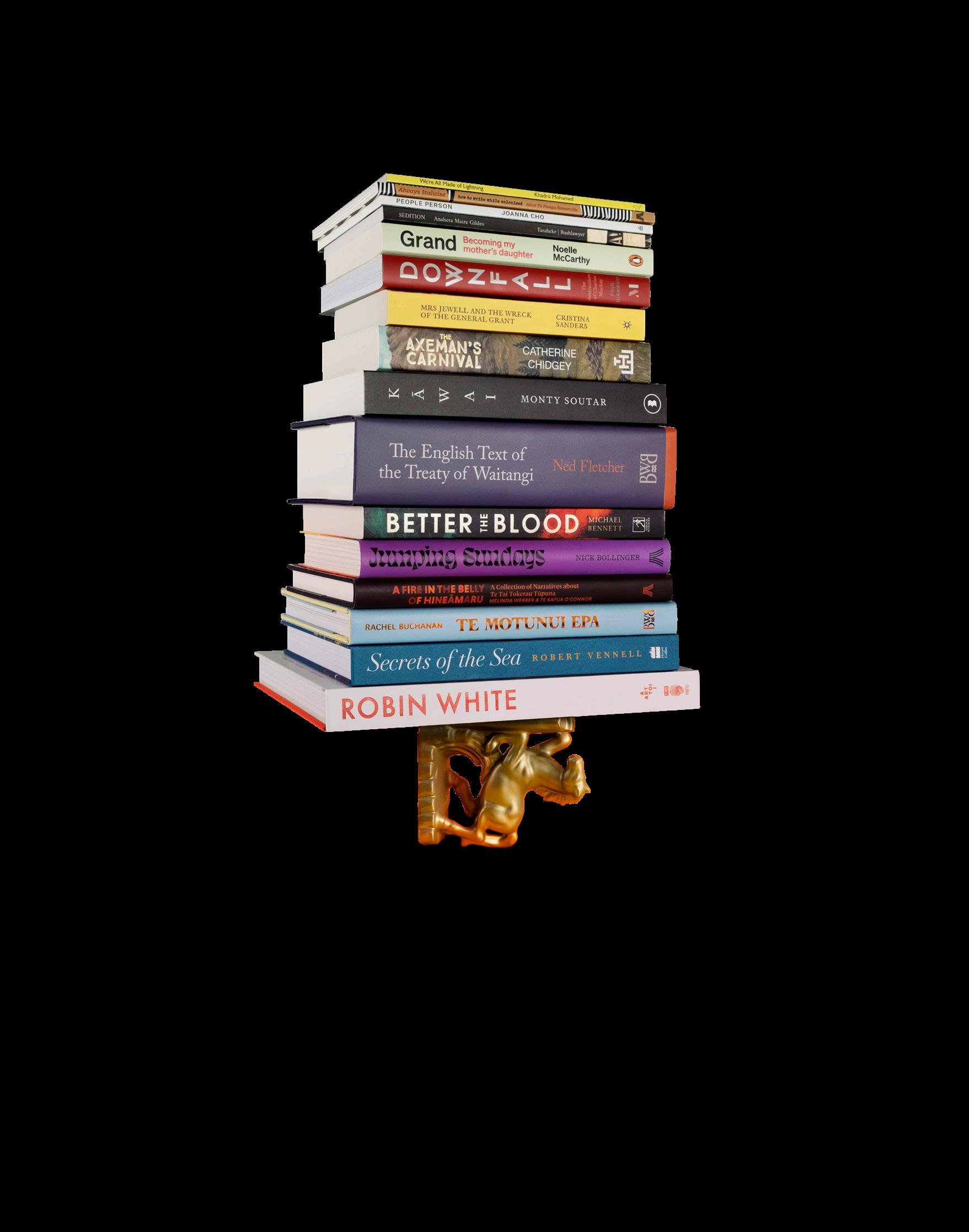Ockhams Sampler
Extracts from the finalist books in the Mary and Peter Biggs Award for Poetry at the 2023 Ockham New Zealand Book Awards

Extracts from the finalist books in the Mary and Peter Biggs Award for Poetry at the 2023 Ockham New Zealand Book Awards
The Mary and Peter Biggs Award for Poetry at the Ockham New Zealand Book Awards considers both selections and collections of poetry, from one or more authors. The winning book receives $12,000.

Judging the poetry award in 2023 are Dunedin poet, author and creative writing tutor Diane Brown (convenor); poet and kaiako Serie Barford; and Wellington poet and Grimshaw-Sargeson Fellow Gregory Kan.
The judging panel says the category finalists all portray a precarious world where nothing can be taken for granted. “The turbulent events of the last few years are reflected in the four finalists’ collections, with poets interrogating language, racism, sexism, climate change and systems. These tensions are often reflected in poetic forms, long lines with fractured spaces dismantling the barrier between prose and poetry.“
This Ockhams Sampler gives you a taste of the craft at play in each of this year’s shortlisted poetry collections. You can read the judges’ comments about each finalist in orange at the start of that title’s extract.
Look out for samplers of the finalists in the other three categories in the Ockham New Zealand Book Awards. As they are rolled out in the coming weeks, you will find them here:
www.issuu.com/nzbookawards
www.anzliterature.com
https://www.nzbookawards.nz/new-zealand-book-awards/resources/

Alice Te Punga Somerville
Published by Auckland University Press

Joanna Cho
Published by Te Herenga Waka University Press

Anahera Maire Gildea
Published by Taraheke | Bush Lawyer

Khadro Mohamed
Published by We Are Babies Press, Tender Press

Alice Te Punga Somerville’s meticulously crafted collection resonates with aroha, wit, sadness and anger. Advice to “italicise all of the foreign words in her poems” becomes a catalyst to exploring the dynamics of racism, colonisation, and writing in English as a Māori writer. Poems float like gourds strung with musings and personal recounts. English words incline as foreign words, but te reo syllables evade linguistic ambushes, camouflaged soundscapes and erasure. They stand upright, mark Space-Time like pou.
My friend was advised to italicise all the foreign words in her poems. This advice came from a well-meaning woman with NZ poetry on her business card and an English accent in her mouth.
I have been thinking about this advice.
The convention of italicising words from other languages clarifies that some words are imported: it ensures readers can tell the difference between a foreign language and the language of home.
I have been thinking about this advice.
Marking the foreign words is also a kindness: every potential reader is reassured that although you’re expected to understand the rest of the text, it’s fine to consult a dictionary or native speaker for help with the italics.
I have been thinking about this advice.
Because I am a contrary person, at first I was outraged — but after a while I could see she had a point: when the foreign words are camouflaged in plain type you can forget how they came to be there, out of place, in the first place.
I have been thinking about this advice and I have decided to follow it.
Now all of my readers will be able to remember which words truly belong in Aotearoa and which do not.
there are captain cooks amongst us too — bullies, throwing their weight around
they think they are the centre of the room but that’s only because they have never been anywhere but there they have no idea about the edges or even how far the room extends one day they will realise that we in the corners are really in other centres they will realise there are no corners no walls
is it a room? is it a room then, when there are no walls?
i used to want to tell them to move over because they take up all the room but there’s no room there is no room
no walls, no room — just links and connections and space
you’re not at the centre; there are no centres you’re just standing there one node in a massive network like the rest of us
I miss those of you who have twisted words into ropes for our people. Had you spliced your cords to the woven lengths the rest of us were making, Instead of showing off your own lovely strands, We could have slowed the sun.
May I grow old enough to be forgotten.
May my questions become passe, may my bibliographies become outdated, may my theories be superseded, may I be obsolete.
May I teach students who teach students who teach students: may I meet these younger thinkers at conferences, may I read and cite their work, may I watch them stand more stably than I could ever have dreamed.
May I sit in committee meetings where young colleagues raise new challenges because the old ones have finally been put to rest.
May I watch the old guard quietly move on, but more than this: may I live long enough to be part of an old guard who younger scholars wish would retire. (May I get to retire.)
May I see scores of Indigenous scholars write hundreds of Indigenous books that ask thousands of Indigenous questions.
May I meet Indigenous vice-chancellors, presidents, professors, and deans; may they not all be men.
May I lie on a future deathbed and look back with regrets related to work rather than regrets related to family.
May my passing be unshocking, not early, not unexpected.
May I run out of ideas before I run out of time.
Published by Te Herenga Waka University Press

Joanna Cho explores relationships, identity and survival with an aching, ironic honesty. A people person may have a name bought from a fortune-teller, drive battered cars, light up rooms with their hearts, or miss the smell of kawakawa ointment. Cho navigates expectations and choices in imagined and recalled stories, skilfully connecting folklore with autobiographical snapshots from South Korea and Aotearoa. Whimsical, surreal, magical and mundane elements meld and clash in poetic vignettes.
The magic sock fitted us all—엄마, 오빠, 언니 and me. No one knew where it had come from, but we found it in the box of toys. It fit in the palm of my hand. There was only one, and it was the colour of ripe tomatoes, like my favourite snack: 엄마 sliced raw tomatoes and brown sugar sprinkled over them like dandelion seeds. We used a fork to eat the tomatoes and then passed the plate around, taking turns slurping the sweet water.
We took turns with the sock, too. We sat in a circle on the carpet in the living room. In this house we only experienced summer and everything was gold and dusty and warm. The sock was the brightest thing in the room. First, it ate up 엄마’s foot, which was pale and slender. In Korea, a long, slim foot is called 칼발. She lifted that knife foot up and wiggled it around, the red nylon catching the afternoon light. Then us kids tried it on, from oldest to youngest: 오빠, 언니, then me. How could one tiny sock fit us all? It was magic.
One day, when the others were off doing their own thing, I went to try the sock on. I touched its shimmery skin and parted the lips. Suddenly the sock whispered, ‘Eunsun, what do you want?’ I jumped a little and rose onto my tippy toes. I glanced around the room, making sure no one was there, and whispered back, ‘Can you make me loved by everyone?’ And then I knew what to do. I put my right foot into the sock.
Later, 엄마 went to the kitchen to prepare an afternoon snack. I smiled my broadest smile and she picked me up from the wooden bowl. She popped me down on the chopping board, brought out a knife and began slicing me from one side to the other. Then she spread me out on a plate and began showering me in sugar. The crystals scattered onto my face, pooled into my ears. I lay there smiling, shaking my head to gather all the sugar I could.
In first year I liked a band called DIANA, capitalised like that and every time I introduced them to someone, I had to type ‘diana band’ on YouTube.
Sometimes, it’s like that.
When I was seven, I had a crush on a boy whose full name was longer than the English alphabet. He had no middle parting and two middle names. They sat next to each other, like he and I on the green bench, eating lunch, getting along.
I liked him at eight, and nine, too.
Sometimes, it’s like that.
I have no middle name, but two first names. Sometimes I hold the door and let my first name go ahead and at other times, my surname deserves it more.
So sometimes, it’s like that, too.
If I decide to give birth, I will write a list of potential names and ask my partner to cross out any they’ve had a thing with.
It is quite likely that our children will not have hot people names. Our parents bought our names from fortune-tellers, each of the three syllables laying out our ancestry and personal truths in the immortal wind
our names are gifts and expectations
but our English names were picked hastily while flicking through TV channels.
Some people have an ‘English name’ and a ‘legal name’. They forget which names they have given to which institutions, use one for ordering takeaways, and for making friends.
Once, a bouncer looked at my ID, laughed and said Ching Chong China . . .
Once, I applied for labouring work and they texted back Jo, are you male or female . . .
Once, a little girl was introduced to the class . . .
Once, I was a lotus, pirouetting in the spring air . . .
Once, I was 조은선 . . .
He teaches me how to ride a bike and that is one less fear. I ride it to the gas station, him running beside me, across bumpy roots and sunburnt grass, on the lake front but I am not his wife.
We order pies and coffees and eat them on the bench, looking out at pine trees. We do this often.
He shows me how to stand on the bike and coast, even and carefree but I am not his wife.
Today I rode to the shop alone, got a pie and coffee and the guy said, ‘Is he resting today’
and the ‘he’ made me smile, the certainty and singularity of it but I am not his wife.

Sedition flows through generations of dis-ease, enlivens tongues stilled by loss and trauma, excavates a genealogy of resistance. It’s a contemplative, defiant collection that resists the commodification of culture and whenua, and the ongoing perversity of neo-colonialism. Poems float upon the notion that we walk into the future facing our past, which embodies and shapes us. Anahera Maire Gildea agitates, untangles and reweaves threads of outrage, dystopia and anguish as she resolutely redraws detrimental power.
When the wharenui was built, it took a life, karakia were spoken over the carved faces, into the tukutuku, shy bodies endowed, responsibility shifted into position, the po po in place of poupou, and the walls –
the council bulldozed it up, uplifted the fence a public works act –but the tapu of the piles stay firm, tamped like plugs into the earth
on the confiscated land a church white, weatherboards hard rows of dark script treats and torts, summon its preacher
it wasn’t clear who would lift the veil at the hura kōhatu, words underneath set in something harder than stone sent back across the road to the urupā – fantails at the gate, keeping out the pregnant
mōteatea remember the sound of the coast, the crying of the seashore
beneath this structure, collected skulls stacked up in soprano cries, forehead to chin, the bones of their ribs, curtains in our theatre of state care.
Time can heal anything.
It can staple over that hole in the ozone feed the starving, end racism. Time is the idealist’s last hope. It can buy that big house and take back that miscarriage, it can do up those buttons that you undid and put that shirt back on.
Time can take your hand from my breast and remove those fingers tracing my spine.
It can take your lips off my thighs and increase the pressure of my hands against your stomach.
Time can silence your quiet laughter in my ear and stop my breath from hasping ragged and caught.
Time can heal anything, you said.
Sometimes there is nothing that can shift the dark black sadness that sticks like tar inside my chest so that when I think of drowning it’s not in water it’s in the thick swollen veins of Papatūānuku under her skin where the world slows mineral rich with oil from ancient dead deprived of oxygen and sealed in their own heat –trapped, reduced –and lightly called “fields” or “springs”.
But if I was punctured bored into penetrated or explored –my tides used to find my deepest complexion so I could be extracted exsanguinated “let”
until the viscous well dried up, was fucking empty would my temperature not rise?
Would my rage not spill not leak from every crusted vent to swirl in pools of emerald and magenta?
Perhaps it is too hard to shift too crude to not expect the pressure that has formed to be my darkest self.

Khadro Mohamed’s elegiac collection features a speaker torn between multiple worlds. Pendulating from prose to lyric, it is a ghostly work in which dreams and memory bleed into each other, as do its places: Egypt, Somalia, Newtown and Kilbirnie. Even time becomes concurrent, and for Mohamed, the past is right there in the present. In this collision of languages and worlds, the possibility and impossibility of home is both grieved and celebrated.
did you hear the news? about Hawa
I heard she’s given up on speaking it happened yesterday when someone told her she reminded them
too much of her mother. a tall woman with an East African nose, and Ghanian skin
a woman with a heavy hand who uses too much hawaji in her curry and not enough ginger flakes in her tea
she climbs date trees with her bare hands, harvests fruit and makes cakes for the elderly man with a missing eye next door
a woman with far too many thoughts in her mind each one bleeding through her skin and forging a
so, she sits back and lets her mother’s ghost do all the talking
You are not violet
You are not hands filled with morning light
You are not skin made of bone
Of tears pooling in the corners of my eyes
You are not the pāua shells that cling to the end of your hair
The same ones you brush back before going to sleep so You don’t have to think so hard about the home you left behind
You are not your mother’s smile
Or the twinkle in your father’s eyes
You are not past musings, or whispers left unsaid
You are not broken coastlines
You are not chipped fingernails
You are not the pharaohs you read about
Or the corn fields in Madagascar that grow widely in the spring
You are not the winds of Island Bay
Or the seaweed-rich shores next door
You are rain, the soft type
That slowly eases into a catastrophic storm
And causes a typhoon that sinks entire villages
And creates swamps filled with mossy water
That overflow in the palms of my hands and create a spring
The same rain that covers my change in the morning
When I’m drenched from head to toe
Okay. So I have some. News about the. Lady that got. Stabbed the other night. In McAlister park. She’d tried. To climb out of the dried up creek. With her fingernails. But there was no use. She got stabbed. 13 times. By a man. Who lives. On the other side. Of Karori West. According to the Dominion Post. And her blood. Coated the dead grass. He must have. Thought she was Muslim. But she wasn’t. She was an Ethiopian. Orthodox Christian. Who wore white cotton. On her head. That looked like a hijab from. Far away. I guess. That’s why he did it. I guess. When you’re. Full of hate. It blinds. You. And. You never read. The. Fine print. Do you?
Halimo, with bits of lilac caught in the coils of her hair told me she’d once saved the world in a single night. That she’d told the Askari boys of Somalia that she’d killed European imperialism with a single branch of castor beans, so they could go home and chew gum. That she’d collected pine needles, growing on one side of Mt Kilimanjaro and drove them through the hearts of the elephant poachers in East
Africa. That she watched them bleed out and become one with the
earth. Then she’d sipped cardamom-rich shaah on an island that floats above the horizon, licking blood clean from her fingers.
Always Italicise: How to Write While Colonised


Whakamihi to all the authors whose work has been recognised and honoured in this this year’s Ockham New Zealand Book Awards. We urge you to seek out their titles in bookstores and libraries around the motu, and to join us to hear the finalists reading from their books, and to celebrate the ultimate winners, at the awards ceremony on Wednesday 17 May, during the Auckland Writers Festival. To find out more follow NewZealandBookAwards or #theockhams on Facebook and Instagram.


The Ockhams Samplers were compiled with the assistance of the Academy of New Zealand Literature.


Look out for the other category samplers at:
